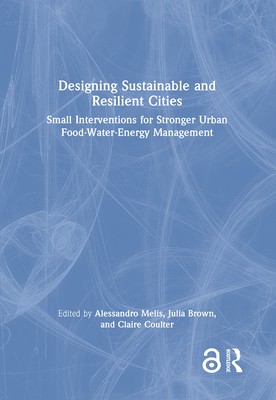
- Išsiųsime per 10–14 d.d.
- Leidėjas: Routledge
- ISBN-10: 0367631989
- ISBN-13: 9780367631987
- Formatas: 17 x 24.4 x 1.4 cm, kieti viršeliai
- Kalba: Anglų
- Extra -15 % nuolaida šiai knygai su kodu: ENG15
Designing Sustainable and Resilient Cities (el. knyga) (skaityta knyga) | knygos.lt
Atsiliepimai
Aprašymas
This book explores the link between the Food-Water-Energy nexus and sustainability, and the extraordinary value that small tweaks to this nexus can achieve for more resilient cities and communities. Using data from Urban Living Labs in six participating cities (Eindhoven, Gdańsk, Miami, Southend-on-Sea, Taipei, and Uppsala) to co-define context-specific challenges, the results from each city are collated into an Integrated Decision Support System to guide and improve robust decision-making on future urban development.
The book presents contributions from CRUNCH, a transdisciplinary team of scholars and practitioners whose expertise spans urban climate modelling; food, water, and energy management; the design of resilient public space; collecting better urban data; and the development of smart city technology. Whilst previous works on the Food-Water-Energy nexus have focused on large, transnational cases, this book explores local ways to use the Food-Water-Energy nexus to improve urban resilience. It suggests tangible ways in which the cities and communities around us can become both more efficient and more climate resilient through small changes to their existing infrastructure.
Over half of the world's population lives in urban areas, and this is expected to increase to 68% by 2050. We urgently need to make our cities more resilient. This book provides a planning tool for decision-making and concludes with policy recommendations, making it relevant to a range of audiences including urbanists, environmentalists, architects, urban designers, and city planners, as well as students and scholars interested in alternative approaches to sustainability and resilience.
EXTRA 15 % nuolaida su kodu: ENG15
Akcija baigiasi už 5d.21:22:25
Nuolaidos kodas galioja perkant nuo 10 €. Nuolaidos nesumuojamos.

- Leidėjas: Routledge
- ISBN-10: 0367631989
- ISBN-13: 9780367631987
- Formatas: 17 x 24.4 x 1.4 cm, kieti viršeliai
- Kalba: Anglų
This book explores the link between the Food-Water-Energy nexus and sustainability, and the extraordinary value that small tweaks to this nexus can achieve for more resilient cities and communities. Using data from Urban Living Labs in six participating cities (Eindhoven, Gdańsk, Miami, Southend-on-Sea, Taipei, and Uppsala) to co-define context-specific challenges, the results from each city are collated into an Integrated Decision Support System to guide and improve robust decision-making on future urban development.
The book presents contributions from CRUNCH, a transdisciplinary team of scholars and practitioners whose expertise spans urban climate modelling; food, water, and energy management; the design of resilient public space; collecting better urban data; and the development of smart city technology. Whilst previous works on the Food-Water-Energy nexus have focused on large, transnational cases, this book explores local ways to use the Food-Water-Energy nexus to improve urban resilience. It suggests tangible ways in which the cities and communities around us can become both more efficient and more climate resilient through small changes to their existing infrastructure.
Over half of the world's population lives in urban areas, and this is expected to increase to 68% by 2050. We urgently need to make our cities more resilient. This book provides a planning tool for decision-making and concludes with policy recommendations, making it relevant to a range of audiences including urbanists, environmentalists, architects, urban designers, and city planners, as well as students and scholars interested in alternative approaches to sustainability and resilience.




Atsiliepimai